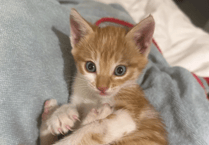The Crufts dog show has been and gone for yet another year and, as usual, it’s sparked criticism from some veterinarians about the health of some of the breeds being exhibited at the show.
Three years ago a German shepherd won the top title even though she had a sloping back that will increase the likelihood of hip dysplasia; and the row over brachycephalic dogs (i.e. ones with short noses like pugs and French bulldogs) has raged for several years because flat faces can restrict breathing.
This year the focus has been on the Japanese Chin with about 100 of them competing at the show for the best of breed accolade.
The Chin is causing controversy because of its eyes - they protrude from the dog’s face and they are surrounded by the whites of the eye, which is unusual.
They look quite cartoon-like, with a constant look of astonishment, but many vets claim that this leaves the dogs with a tendency to be cross-eyed and therefore prone to injury.
The Kennel Club, which runs Crufts, hit back by stating that any Chins with unhealthy eyes would be penalised and that they don’t see the need to change the breed standard.
And if you thought that Crufts might be a good way to escape the subject of Brexit, you’d be wrong.
This year’s show saw the number of overseas dogs competing decline for the first time in over a decade, and the Kennel Club thinks that this is down to fears about travelling with dogs after March 29.
However, the RSPCA thinks the biggest ’no deal’ Brexit issue is the potential for there to be a shortage of vaccines, particularly those that have a short shelf-life and cannot be stockpiled, because so many are imported from the EU. It fears that operations will need to be cancelled and that animals could die.
While the subject of Brexit is a stressful one for many of us humans, poor Devlin, the eight-year-old Akita cross Staffie, is finding life in kennels stressful.
He has such a sweet and gentle personality that he doesn’t enjoy being surrounded by boisterous or noisy dogs.
In fact, all he wants to do is curl up next to his favourite teddy.
We think potential adopters are being put off by his breed type when, in fact, he’s a big softie.
He has been a loyal and loving family dog, but his owners had to move to rented accommodation and couldn’t take him with them.
He’s been well trained and he knows a few tricks (he can ’high five’, for example) and he’s fun to take out on walks because he’ll chase and retrieve tennis balls all day long.
Devlin is looking for a new home where he won’t be left on hs own for long periods of time, and he’ll need to be the only animal in the house - he’ll want his new human family all to himself.
While we don’t want people to make assumptions about Devlin because of his genes, we do understand that some people prefer smaller dogs and so little Bobby is sharing the spotlight this week with Devlin.
Bobby came to us as a stray and so we’re not exactly sure of his age, but we think he’s between eight and 10 years old.
As you might expect from a jack russell he packs a big personality into a little body, although he is a little cautious when he first meets people.
He seems to be fine around other dogs, and the kennels team will facilitate a gentle canine introduction process if potential adopters already have a dog.
It often helps if dogs get to know each other on neutral territory, where they can be taken off the lead and allowed to sense out each other.
An adoption process can take as long as is necessary to ensure that it’s ultimately successful, with new owners who know what to expect and who have the necessary ongoing support.



-(1).jpeg?width=209&height=140&crop=209:145,smart&quality=75)
.jpg?width=209&height=140&crop=209:145,smart&quality=75)
Comments
This article has no comments yet. Be the first to leave a comment.